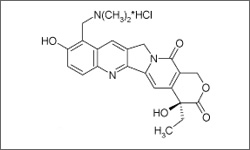Topotecan

Topotecan is a cancer medicine that interferes with the growth and spread of cancer cells in the body. Topotecan is used to treat ovarian cancer, small cell lung cancer, and certain types of cervical cancer.
How this drug is given:
-
Hycamtin is given through an infusion into a vein (intravenous, IV).
-
The amount of Hycamtin that you will receive depends on many factors, including your height and weight, your general health or other health problems, and the type of cancer or condition being treated. Your doctor will determine your dose and schedule.
Topotecan (Hycamtin®) is a topoisomerase inhibitor which causes breaks in DNA through binding and cleaving of topoisomerase I. This can lead to apoptosis and halting of DNA synthesis.1
Hycamtin (topotecan) is a semi-synthetic derivative of camptothecin and is an anti-tumor drug with topoisomerase I-inhibitory activity. Topoisomerase I relieves torsional strain in DNA by inducing reversible single strand breaks. Topotecan binds to the topoisomerase I-DNA complex and prevents religation of these single strand breaks. The cytotoxicity of topotecan is thought to be due to double strand DNA damage produced during DNA synthesis, when replication enzymes interact with the ternary complex formed by topotecan, topoisomerase I, and DNA. Mammalian cells cannot efficiently repair these double strand breaks.
The diagram below shows the 3D molecular structure of Topotecan.
- 1 Chu, E., & DeVita, V. T. (2015). Physicians' cancer chemotherapy drug manual 2015. Burlington, MA: Jones & Bartlett Learning.
The following side effects are common (occurring in greater than 30%) for patients taking Hycamtin: low blood counts (your white and red blood cells and platelets may temporarily decrease; this can put you at increased risk for infection, anemia, and/or bleeding); nausea and vomiting; hair loss; and diarrhea.
The following side effects are less common (occurring in about 10-29%) for patients receiving Hycamtin: constipation; fatigue; fever; abdominal pain; bone pain; weakness; mouth sores; poor appetite; rash (see skin reactions); shortness of breath; cough; and headache.
